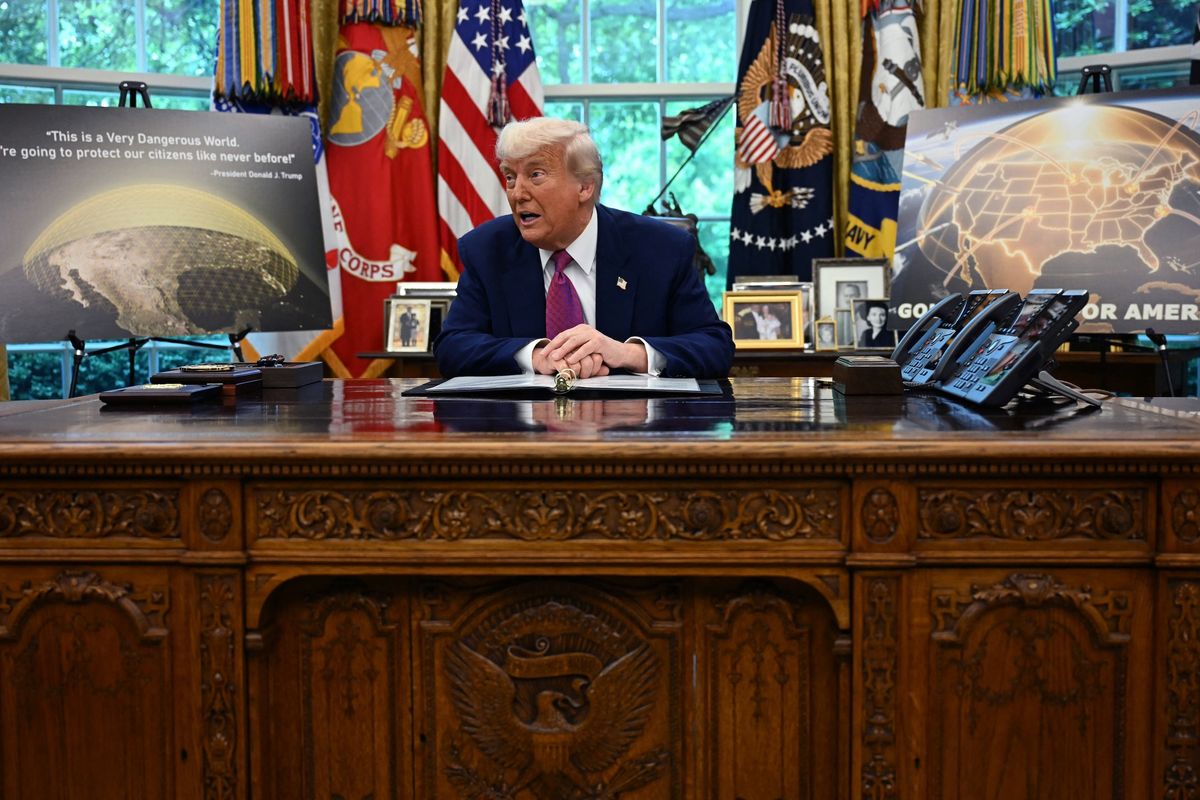OPINION — Navy Secretary Richard V. Spencer last week joined the very public chorus of defense experts in questioning whether President Trump’s call for reducing fiscal 2020 DoD spending to $700 billion will actually take place.
With the deficit soaring, Trump back in mid-October, told his cabinet members, with TV cameras rolling, “I’d like you all to come back with a five percent cut. If you do that, we will be very happy. There are some people sitting at the table…that can really do more.”
At the time, Trump suggested the Pentagon would only have to go down to $700 billion, which would mean slightly less than a three percent reduction.
Appearing last Thursday at the Center for Strategic and International Studies (CSIS), Spencer said, “It is the president’s budget, and the top line hasn’t been presented to us yet.” But he quickly added, “We are working various scenarios, and two things to say there. Some of the scenarios will make your eyes water with what we might have to do if the numbers are certain numbers,” i.e. $700 billion.
He then explained that with the past two years of budget growth, to this year’s $716 billion for the Defense Department, and the earlier planned prospect of $733 billion for fiscal 2020, “we’ve laid the foundation and spent this money to get us going in the right direction. The bicycle is up. We are pedaling. Please don’t knock us over. The waste would be absolutely stunning.”
Spencer is far from alone in bucking against Trump’s October budget proposal.
On December 1, in a speech before the Reagan Library’s National Security Forum, Defense Secretary James Mattis called Trump’s action, “the normal give and take of building the president's budget,” and added, “This is not a decision. This is where the president is trying to sort out competing priorities.”
Mattis then referred to a Wall Street Journal op-ed from two days earlier entitled “Don’t Cut Military Spending,” from Rep. Mac Thornberry (R-Texas) and Sen. James Inhofe (R-Okla.), who just happen to chair the House and Senate Armed Services committees. They wrote that Trump’s “last minute directive to cut $33 billion from [fiscal 2020] defense would be dangerous.”
Nobody’s fool, Mattis went on to say, “The issue is in play, and I'll give my advice to the president. I owe him the courtesy of that in private before I speak about it publicly.”
But he went on to make it clear where he stood saying, “We've got to make certain we restore America's strength. You know, and I know, that has been President Trump's platform from the beginning. It's up to me to make the logical argument about what the president's submission should look like from Office of Management and Budget to the Congress.”
Mattis took up a line that the committee chairmen had used, “Cutting defense will not close the deficit and I would suggest that doing so would be a disservice to our troops and the American people they serve and protect because we all know here today that America can afford survival.”
Although Trump tweeted on Dec. 3, that spending $716 billion on defense was “Crazy,” it appears not only will he reinstate the originally planned $733 billion for the Pentagon, he may allow that figure to go even higher, maybe $750 billion, according to Jim McAleese, who keeps a close eye on the defense budget.
Mattis also moved away from Trump when it came to his views on Korea, Iran and Russian President Vladimir Putin.
Asked what the most urgent threat to the U.S. is right now, Mattis told the Reagan Library audience, “In terms of urgency, North Korea is the problem.” He said that despite Trump’s statement that the North Korean nuclear threat has diminished, Mattis’ view of urgency came from the fact that up until now, both China and Russia have been voting with us, implying that if progress is not immediate, those key partners in this case, will slip away, as they are already doing when it comes to observing trade sanctions.
Mattis also said that he believes North Korea today represents more of a worldwide threat than that posed by Iran, although, he added, Tehran “could grow beyond that [as a regional threat] if it’s not dealt with.”
From the point of shear power, Mattis said Russia was the main U.S. threat, despite the fact that President Trump still considers Putin a friend.
“There is no doubt the [Moscow] relationship has worsened,” Mattis said, adding that Putin “tried again to muck around in our elections this last month,” something Trump has not acknowledged. “We find that Russia, on the surface, tries to make certain very deceitful statements stick. They don't stick. Their actions speak louder than words, and it has worsened the relationship.”
At CSIS, Navy Secretary Spencer took some issue with President Trump’s desire to establish a Space Command. He opened by saying, “You’ve all read the president’s intent, which as you know with the chain of command, we salute and march out smartly.” But he limited that to a fundamental agreement “there should be a common – some sort of common receptacle for space assets, space technologies, space acquisitions, space strategy.”
Spencer said he knew “what requirements I have to fill for the Navy mission. In some cases, I do want to develop them; in many cases I probably do not.” He said with regard to space, that the Navy does “need to put the assets against it. The structure [for Space Command] we’ll have to wait and see how the Congress actually vets it out, along with the president’s ideas. But on a fundamental basis, whether it’s a SOCOM model, whether it’s its own command, I definitely support the concept that we do need a center of excellence for space.”
On the Space Command issue, the last word went to CSIS President John Hamre, a former Deputy Defense Secretary, who said, “The last thing you want to do is to make it a separate service. When did you see resource-shares move across service lines? This is a dumb idea if you’re trying to get more money into space.”
It seems open season for former and even current top Defense Department officials to challenge the Commander-in-Chief’s ideas.
Read more of Walter Pincus' Fine Print here...















